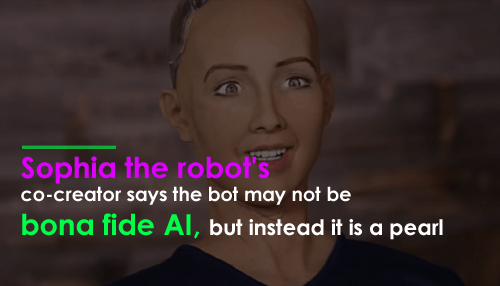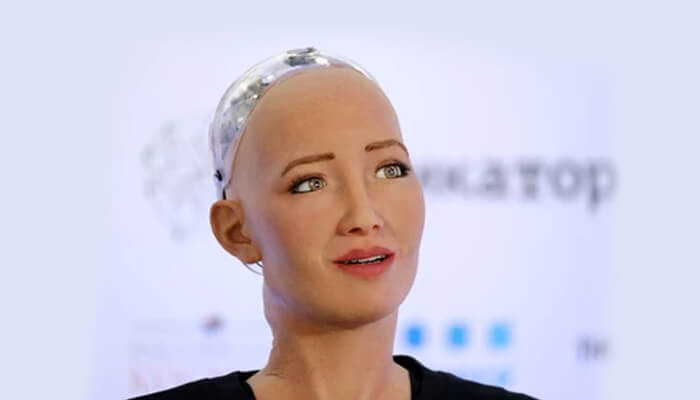The robot’s, which is named as Sophia, got citizenship of Saudi Arabia last month, but many of people are not showing their happiness about it.
Some noticeable the unpleasant ambiguity of a robot tolerating ‘rights’ in a country where women were similarly starting allowed to drive recently. Others said it set a horrendous perspective for how we may treat robots in the future. (AI ethicist Joanna Bryson said The Verge the stunt was “obviously bullshit.”)
Some were bothered about the perspective of Sophia itself — a robot that is in like manner a media star, with magazine cover-shoots, network show appearances, and even a talk to the UN. Masters in the field all over ruin Sophia as critical of AI development and say that notwithstanding the way that the bot is shown quite recently like two or three programming updates a long way from human-level awareness, it’s more about illusion than intelligence.
For Ben Goertzel, chief scientist at Hanson Robotics, the company that made Sophia, the condition is conflicting, indeed. Geoertzel said in his interview with the Verge, it was “not impeccable” that some thought of Sophia as having reproduced general understanding or AGI (the industry term for human-indistinguishable learning) in any case, he perceived that the confused judgment had its upsides.
During his career as a researcher, most of the people believed that I will never achieve human-level AI, but, now the public thinks we are already there.
According to his opinion, overestimate is better than the underestimate, our odds of making machines cleverer than humans. He said, “I’m a huge AGI optimist, and I believe we will get there in five to ten years from now.”
He accepts that Sophia’s introduction disturbs specialists, however, shields the bot by saying it passes on something unique to the people.
“In the event that I advise individuals I’m utilizing probabilistic rationale to do thinking on how best to prune the backward chaining inference trees that emerge in our logic engine, they have no clue what I’m discussing about. But if I show them a beautiful smiling robot face, then they get the feeling that AGI may indeed be nearby and viable.”
He says there’s a more obvious preferred standpoint also: in this present reality where AI capacity and interest is sucked towards big tech company in Silicon Valley, Sophia can function as a stabilizer; something that gets the attraction, and with that, funding. “What does a startup get out of having massive international publicity?” he says. “This is obvious.”
Most people would agree that Sophia isn’t unintelligent, either. As Goertzel, who is as of now constructing a “decentralized market for AI,” calls attention to, it makes the employment of a wide number of AI strategies. There’s face tracking, emotion recognition, and robotic movements produced by deep neural networks.
What’s more, albeit the vast majority of Sophia’s dialogues originate from a straightforward choice tree (a similar tech utilized by chatbots; when you say X, it answers Y), what it says is coordinated with these other inputs to a one of a kind mold.
It’s not pivotal in the way that works coming out of Companies like DeepMind or university labs, yet it’s not a toy.
“None of this is the thing that I would call AGI, however, nor is it simple to get working,” says Goertzel. “Additionally, it is totally cutting edge with respect to the dynamic joining of perception, action, and dialogue.”
The last item is certainly enrapturing, and despite Sophia’s frequently stilted and ungainly exchange, watchers seem, by all accounts, to be left with a sentiment something more.
A lot of this impact can be credited to make by Hanson Robotics coordinator David Hanson, who, for quite a while, was a Walt Disney Imagineer, building figures for the company’s theme parks.
It’s Hanson who every now and again exaggerates Sophia’s capacity for consciousness, uncovering to Jimmy Kimmel earlier this year that the robot was “generally alive,” for example.
While we can without a lot of an extent get lost fighting the thinking and semantics of judging what is and isn’t “alive,” it’s all the more clear to express that this declaration is frightfully beguiling.
When I ask Goertzel how he squares his need to have people genuinely fathom Sophia’s capacities with Hanson’s comments, he says:
“Well, David is his own particular individual, and he by and large talks from his heart. He doesn’t for the most part express things the right way I would.
Regardless, I would express that he’s an expert and a stone carver, and he came at this since he expected to impact his figures to wake up. He’s made assumes that move and talk, and reason, and do abduction and deduction.
So in his view, talking from his heart, he’s impacting his figures to wake up.” He incorporates: “I don’t think David ever says something just from a displaying or PR perspective. He’s the truest individual I know.”
Furthermore, when asked about comments from scholastics like Bryson, who suggest that giving robots rights corrupts human ones, Goertzel vehemently contradicts this thought.
He says Saudi Arabia’s decision to give Sophia citizenship exhibits the country’s need to be more powerful.
“Observationally, in Saudi Arabia, the permitting of robot rights is all in all related with increases rather than reduces all-around human rights,” he says, demonstrating late changes like allowing Jewish people to work in the country, and the decision to give women the benefit to drive.
Critics may deliver a reply that giving one robot “rights” in an administration expected to pull in thought with respect to a lavishly funded tech conference doesn’t show any particular ethical probity.
Furthermore, really, in a country where homosexuality is punishable by death and transient workers are kept in slave-like conditions, some may explain it as the correct reverse: as e a tra affirmation of “rights” being managed without due regard.
As Bryson put it: “How might it impact people in case they figure you can have a citizen that you can buy?”
Goertzel says these are significant questions, and he assumes that Hanson Robotics and Sophia are enacting reasonable exchange. It’s without a doubt something he himself enjoys.
When I ask with respect to whether he assumes Siri is justifying citizenship, he says it would be “pretty funny,” however raises qualities that Sophia has that Siri doesn’t, like uniqueness, and a physical presence.
“What precisely degree are these properties crucial for being seen as deserving of rights?'” he asks. “[It’s] an interesting direction for thinking.”
Goertzel says that at the present rate of progress, society will most likely be constrained to reconsider thoughts like rights, and possibly larger part administers framework.
He offers the (to an incredible degree unrealistic and viably avoidable) instance of some individual 3D-printing a gathering of robots on account of voting rights keeping the ultimate objective to swing a race.
“If you adjusted them to vote undeniably, and they all autonomously work the same way, by then out of the blue you have a dictatorship by robots,” he says.
In case you believe the super-insightful AIs are for all intents and purposes around the twist, by then these future crushing inquiries.
But enough real and current threats in the field of artificial intelligence can be found out — from bias in the algorithms handing out prison sentences to AI-powered surveillance states — to impact these hypothetical issues to seem like indulgent sideshows.
Various researchers and experts say what’s by and by required is a prevalent open perception of AI; of its present capacities and obstructions. With respect to taking note of that call, Sophia is from every angle achieving more harm than awesome.
For Goertzel and Hanson Robotics, there are numerous factors at play. When I ask with respect to why Sophia keeps getting media appearances and emerging as genuinely newsworthy, Goertzel’s answer is fundamental:
“People love [them], they both disturb and enchant people. Whatever else they are, they are fantastic works of art.”



